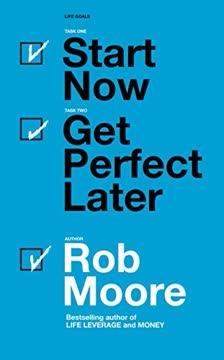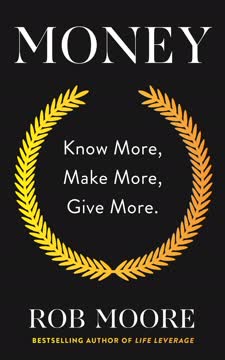Key Takeaways
1. Start Now, Get Perfect Later: Embrace Imperfection
Start now. Get perfect later. Just do it. End of book.
Perfection is a myth. The pursuit of perfection often leads to procrastination and paralysis. Instead, embrace the idea of "starting now and getting perfect later." This mindset encourages action and allows for continuous improvement along the way.
Imperfect action is better than perfect inaction. It's more valuable to take imperfect action and learn from the experience than to wait for the "perfect" moment, which may never arrive. This approach allows you to gain momentum and build confidence. Examples include:
- Launching a product with a minimum viable product (MVP)
- Writing a first draft without editing
- Starting a business before having all the details figured out
Embrace the journey. Focus on progress, not perfection. Celebrate small wins and learn from mistakes. This mindset fosters resilience and encourages continuous growth.
2. Decisiveness: The Spark That Ignites Action
Decisiveness is the spark that ignites action. The courageous facing of issues, knowing that if they are not faced, problems will remain forever unanswered.
Decisiveness is a skill. It can be developed and strengthened over time. It involves making decisions quickly and effectively, even in the face of uncertainty. Decisiveness is not about being reckless, but about having the courage to act.
Decisiveness is a leadership trait. It inspires confidence and motivates others to take action. Indecisiveness, on the other hand, can lead to stagnation and missed opportunities. Examples include:
- Making quick decisions in a crisis
- Taking calculated risks to seize opportunities
- Clearly communicating decisions to others
Overcome analysis paralysis. Don't get bogged down in overthinking. Gather enough information to make an informed decision, then act. Remember, it's better to make a decision and adjust course later than to remain stuck in indecision.
3. Overcome Procrastination: Unearth the Hidden Fears
Procrastination and indecisiveness are normal human traits that serve to help us avoid fear, pain and threatening situations.
Procrastination is a self-protection mechanism. It's often rooted in fear of failure, fear of judgment, or fear of the unknown. Understanding the underlying cause of procrastination is the first step to overcoming it.
Identify your fears. What are you afraid of? What's the worst that could happen? By confronting your fears head-on, you can diminish their power and take control of your actions. Examples include:
- Fear of failure: Reframe failure as a learning opportunity
- Fear of judgment: Remember that other people's opinions don't define you
- Fear of the unknown: Break down large tasks into smaller, more manageable steps
Break the cycle. Once you've identified your fears, develop strategies to overcome them. This might involve seeking support from others, practicing self-compassion, or challenging negative thoughts.
4. Time Management: It's About Life, Not Just Minutes
You can’t manage time. It’s a delusion.
Time is a finite resource. We all have the same 24 hours in a day. The key is to manage our energy, focus, and priorities, not the clock itself. This involves making conscious choices about how we spend our time and aligning our actions with our values.
Prioritize your life. Identify your "rocks" – the most important things in your life, such as family, health, and personal growth. Schedule time for these activities first, then fill in the remaining time with less critical tasks. Examples include:
- Scheduling family dinners
- Blocking out time for exercise
- Setting aside time for personal reflection
Eliminate time wasters. Identify activities that drain your energy and provide little value. Minimize or eliminate these activities to free up time for more meaningful pursuits.
5. The Power of Routine: Design Your Ideal Day
Routine = Results
Routines create structure and predictability. They reduce decision fatigue and free up mental energy for more important tasks. A well-designed routine can help you stay focused, productive, and balanced.
Design your ideal day. Consider your energy levels, priorities, and values when creating your routine. Schedule your most important tasks for times when you're most alert and focused. Examples include:
- Morning routine: Exercise, meditation, and planning
- Work routine: Focused work blocks, breaks, and meetings
- Evening routine: Relaxation, reflection, and preparation for sleep
Be flexible and adaptable. Life happens. Don't be afraid to adjust your routine as needed to accommodate unexpected events or changing priorities. The key is to maintain a general structure while remaining open to flexibility.
6. Leverage & Outsource: Free Yourself to Grow
If you want something done…Do. Not. Do. It. Yourself
Leverage is the key to scaling. It involves using other people's time, resources, and expertise to achieve your goals. This allows you to focus on your strengths and delegate tasks that are better suited to others.
Identify tasks to outsource. What tasks do you dislike? What tasks are you not good at? What tasks can be done more efficiently by someone else? Examples include:
- Administrative tasks
- Social media management
- Bookkeeping
- Customer service
Build a team. Surround yourself with talented individuals who complement your skills and share your vision. Delegate tasks effectively and empower your team to take ownership.
7. Intuition & Information: A Balanced Approach
The balancing of intuition and information is the dance between research and action.
Intuition is valuable, but not always reliable. It's based on past experiences and can be a powerful guide, but it's important to balance it with objective information. Don't rely solely on your gut feeling.
Gather information strategically. Do your research, but don't get bogged down in analysis paralysis. Aim for 75% of the information you need, then make a decision and act. Examples include:
- Reading reviews before buying a product
- Consulting with experts before making a major investment
- Conducting market research before launching a new business
Trust your instincts, but verify. Use information to validate or challenge your intuition. This approach allows you to make more informed decisions and avoid costly mistakes.
8. De-Risk the Downside: Protect Your Potential
If you don’t risk anything, you risk everything.
Risk is inherent in life. But it can be managed. Don't be afraid to take calculated risks, but always protect the downside. This involves minimizing potential losses and maximizing potential gains.
Strategies for de-risking:
- Start small: Test new ideas with minimal investment
- Diversify: Don't put all your eggs in one basket
- Insure: Protect yourself against unforeseen events
- Negotiate: Secure favorable terms and conditions
Know the difference between risk and gambling. Risk is a calculated decision based on research and analysis. Gambling is a blind bet based on emotion and hope.
9. The Inner Bas-tard: Manage Your Emotions
To manage your emotions well is to master your life.
Emotions can cloud judgment. They can lead to impulsive decisions and regrettable actions. It's important to develop strategies for managing your emotions and making rational choices.
Strategies for managing emotions:
- Observe: Take a step back and observe your emotions without judgment
- Understand: Identify the underlying cause of your emotions
- Control: Develop techniques for managing your reactions
- Seek support: Talk to a trusted friend, therapist, or coach
Don't suppress your emotions. Acknowledge and validate your feelings, but don't let them control your behavior. Find healthy ways to express your emotions, such as exercise, journaling, or creative pursuits.
10. Vision & Values: Your Compass for Decisions
If it’s important enough to you, you’ll find a way. If not, you’ll find an excuse.
Vision and values provide clarity. They serve as a compass, guiding your decisions and actions. When faced with a difficult choice, ask yourself: Does this align with my vision? Does this honor my values?
Define your vision. What do you want to achieve in your life? What kind of person do you want to be? Your vision should be ambitious, inspiring, and aligned with your values.
Identify your values. What's most important to you? Family? Freedom? Creativity? Authenticity? Your values should guide your decisions and actions.
11. Problem Solvers Rule: Embrace the Challenge
Problem solvers rule the world.
Problems are opportunities. They're chances to learn, grow, and create value. Embrace challenges and approach them with a positive mindset.
Develop problem-solving skills. Learn to identify the root cause of problems, brainstorm solutions, and implement effective strategies. This involves critical thinking, creativity, and collaboration.
Focus on solutions, not problems. Don't dwell on the negative aspects of a situation. Instead, focus on finding solutions and taking action. This mindset fosters resilience and encourages progress.
Last updated:
FAQ
1. What’s "Start Now. Get Perfect Later." by Rob Moore about?
- Overcoming Procrastination: The book is a practical guide to banishing procrastination and indecisiveness, helping readers take action even when they don’t feel ready.
- Decision-Making Mastery: It teaches how to make smarter, faster, and bigger decisions by breaking down the myths and fears that hold people back.
- Personal and Professional Growth: Rob Moore shares his own struggles and strategies, making the book relatable for anyone wanting to improve productivity, confidence, and results in any area of life.
- Action Over Perfection: The core message is to start now, take imperfect action, and improve as you go, rather than waiting for the perfect moment or plan.
2. Why should I read "Start Now. Get Perfect Later." by Rob Moore?
- Universal Relevance: Whether you’re an entrepreneur, professional, student, or creative, the book addresses common barriers like procrastination, overwhelm, and fear of failure.
- Practical Tools: It offers actionable techniques, frameworks, and mindset shifts that can be immediately applied to daily life and work.
- Real-Life Examples: Rob Moore uses personal anecdotes and research to illustrate concepts, making the advice credible and relatable.
- Long-Term Benefits: By applying the book’s principles, readers can expect to get more done, reduce stress, make better decisions, and ultimately achieve more success and satisfaction.
3. What are the key takeaways from "Start Now. Get Perfect Later." by Rob Moore?
- Don’t Wait for Perfection: Perfectionism is a form of procrastination; starting now and improving later leads to real progress.
- Decisions Are Muscles: Decision-making improves with practice; the more you decide, the better and faster you get.
- Chunk Down Big Tasks: Break large goals into small, manageable steps to reduce overwhelm and build momentum.
- Leverage and Outsource: Focus on your strengths and delegate or outsource tasks that drain your time and energy.
- Routine Equals Results: Creating and sticking to effective routines and systems is key to consistent productivity and freedom.
4. How does Rob Moore define procrastination and indecisiveness in "Start Now. Get Perfect Later."?
- Self-Protection Mechanism: Procrastination is not a character flaw but a self-protection mechanism to avoid fear, pain, or threats to self-worth.
- Not an Identity: Moore argues you are not a procrastinator by nature; you procrastinate in areas where you lack confidence or interest.
- Hidden Benefits: Procrastination can serve to conserve energy, resist authority, or avoid the pressure of success and expectations.
- Outdated Programming: Our brains are wired for survival in a different era, making procrastination a natural but often outdated response in modern life.
5. What is the "Start Now. Get Perfect Later." method and how do I apply it?
- Take Imperfect Action: Begin tasks or decisions before you feel fully ready, accepting that your first attempt won’t be perfect.
- Iterate and Improve: Treat every action as a test; review, tweak, and repeat to get better over time.
- Reduce the Weight of Decisions: Break big decisions into smaller ones, and don’t overestimate their permanence or importance.
- Embrace Feedback: Use feedback and results from your initial actions to guide your next steps, rather than waiting for certainty.
6. What are the main causes of procrastination according to Rob Moore?
- Fear of Failure or Judgment: Worrying about making mistakes, being wrong, or being judged by others.
- Overwhelm and Too Many Choices: Having too many options or tasks can paralyze action.
- Perfectionism: Wanting everything to be perfect or completely ready before starting.
- Lack of Clarity or Motivation: Not seeing the benefits or being unclear about the next step.
- Evolutionary Programming: Our brains are wired to avoid risk and conserve energy, which can manifest as procrastination in modern contexts.
7. How does "Start Now. Get Perfect Later." suggest overcoming perfectionism and overwhelm?
- Strive for Excellence, Not Perfection: Focus on doing things well, not perfectly, and accept mistakes as part of growth.
- Diminish Importance and Permanence: Remind yourself that most decisions aren’t as big or permanent as they seem.
- Chunk Down Tasks: Break large projects into small, actionable steps to make starting easier.
- Set Deadlines and Use Accountability: Impose deadlines and involve others to create positive pressure and reduce the urge to delay.
8. What are some practical tools and techniques from "Start Now. Get Perfect Later." for better productivity?
- The Pomodoro Technique: Work in focused 25-minute sprints with short breaks to maintain energy and concentration.
- ‘To Leverage’ Lists: Replace traditional to-do lists with leverage-first lists, delegating or outsourcing tasks before doing them yourself.
- Routine and Diary Management: Design your day around your energy highs and lows, blocking out time for your most important tasks.
- Batching and NETime: Batch similar tasks and use ‘No Extra Time’ strategies to maximize efficiency (e.g., listening to audiobooks while commuting).
9. How does Rob Moore recommend making faster and better decisions in "Start Now. Get Perfect Later."?
- Law of Proportional Decision Making: Invest time in decisions proportional to their importance; don’t overthink small choices.
- Use Both Intuition and Information: Balance gut feelings with research, aiming for about 75% readiness before acting.
- Test, Review, Tweak, Repeat: See decisions as experiments; act, review results, make adjustments, and repeat the process.
- Crowdsource and Seek Counsel: Leverage the experience and feedback of others to reduce risk and improve outcomes.
10. What are the key concepts and definitions unique to "Start Now. Get Perfect Later." by Rob Moore?
- Inner Bas-tard: The nagging, self-sabotaging voice in your head that fuels procrastination and self-doubt.
- GOYA and JFDI: Acronyms for "Get Off Your Arse" and "Just F***in’ Do It"—Moore’s rallying cries for immediate action.
- KRAs and IGTs: Key Result Areas and Income Generating Tasks—focus areas that drive the most value and results.
- Routine = Results: The idea that consistent routines and systems are the foundation of productivity and freedom.
- WISLR: Framework for time management—Waste, Invest, Spend, Leverage, Recover.
11. What are the best quotes from "Start Now. Get Perfect Later." and what do they mean?
- "Start now. Get perfect later." – The core philosophy: take action before you feel ready, and improve as you go.
- "To know and not to do is not to know." – Knowledge without action is useless; implementation is what matters.
- "You are not a procrastinator, but you do it sometimes." – Don’t label yourself; recognize procrastination as a behavior, not an identity.
- "If you want something done, find someone faster or better to do it." – Emphasizes the power of leverage and outsourcing.
- "Routine equals results." – Consistent habits and systems are the key to achieving long-term goals.
12. How can I design my ideal routine and life using the advice from "Start Now. Get Perfect Later."?
- Identify Your Rocks, Pebbles, Sand, and Water: Define your most important priorities (rocks), secondary interests (pebbles), minor tasks (sand), and external demands (water) to structure your time effectively.
- Track and Analyze Your Time and Energy: Use 21-day work and energy logs to discover when you’re most productive and what tasks bring the most value.
- Compartmentalize Your Diary: Block out time for your highest priorities first, aligning tasks with your energy peaks and minimizing interruptions.
- Leverage, Automate, and Outsource: Build systems and routines that allow you to focus on your strengths, delegate weaknesses, and create more freedom and results in your life.
Review Summary
Start Now. Get Perfect Later. receives mixed reviews, with an average rating of 3.57/5. Some readers find it motivating and practical, praising the author's engaging style and actionable advice on overcoming procrastination. Others criticize it as repetitive, lacking originality, and too focused on entrepreneurship. The book's short chapters and direct approach appeal to many, while some find the humor and self-promotion off-putting. Overall, it's seen as a quick read that may benefit those new to self-help but offers limited value for experienced readers.
Similar Books
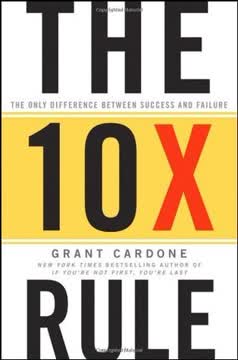
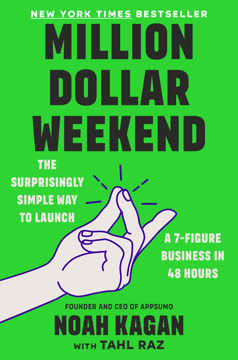

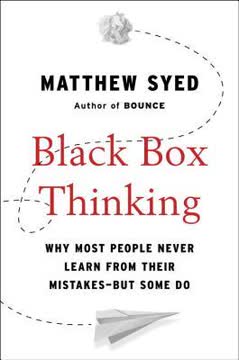
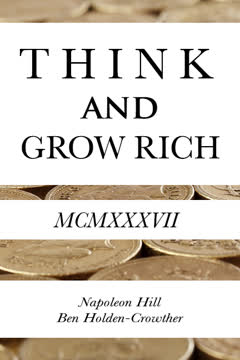
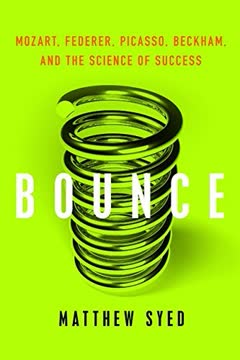
Download PDF
Download EPUB
.epub digital book format is ideal for reading ebooks on phones, tablets, and e-readers.
